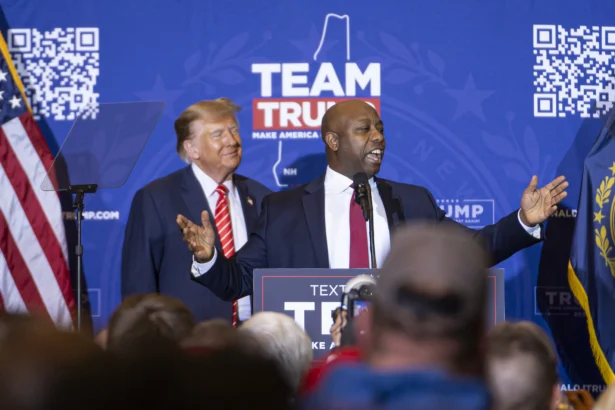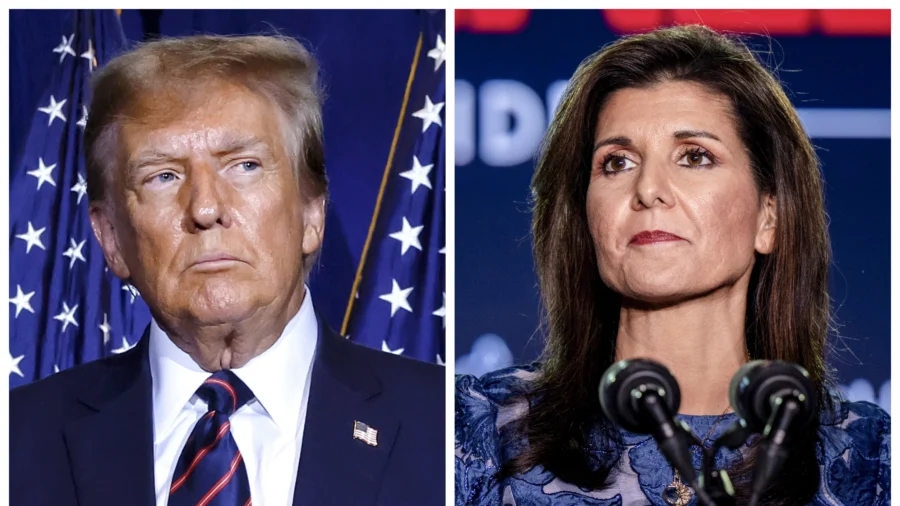The South Carolina Republican primary is the fourth presidential nominating contest of 2024 but only the second head-to-head matchup between former President Donald Trump and former U.N. Ambassador Nikki Haley.
President Trump holds a commanding advantage in South Carolina polls, leading Ms. Haley with 65 percent to her 32 percent in an average of recent polls reported by FiveThirtyEight. That margin has changed little since the first of the year.
Though Ms. Haley was twice elected governor of South Carolina, she never enjoyed popularity with the state’s GOP establishment. A large number of South Carolina’s Republican elected officials have endorsed her opponent. They include Gov. Henry McMaster, Lt. Gov. Pamela Evette, and Attorney General Alan Wilson. Also endorsing President Trump are U.S. Sens. Tim Scott and Lindsey Graham, and Rep. Nancy Mace.
Rep. Ralph Norman (R-S.C.) is the only sitting member of the U.S. House of Representatives to endorse Ms. Haley.
While President Trump is heavily favored to win the Feb. 24 contest, this election promises to reveal information about the candidates and the electorate that could impact November’s general election.
Here’s what we’ll be watching for in the first 2024 Republican primary to be held in the South.
Voter Turnout
Voter turnout was low in South Carolina’s Democratic presidential primary on Feb. 3, possibly because President Joe Biden was virtually unopposed on the ballot.
Although polling suggests a landslide victory for President Trump, voter interest in the GOP contest is keen, as evidenced by the rate of early voting.
Early voting for the South Carolina Republican primary is allowed from Feb. 12 to Feb. 22, and participation totals are published daily.
The earliest totals reveal that South Carolina’s Republican presidential primary has already attracted many more participants than the Democratic primary earlier this month, and not by a small margin.
The South Carolina Election Commission recorded 95,012 votes cast as of Feb. 17, the fifth day of the early voting period. That is more than double the 48,213 recorded over the entirety of the Democratic presidential primary’s early voting period of Jan. 22 to Feb. 2.
Early voting in the GOP contest is on pace to eclipse the total number of votes cast in the entire Democratic contest, which was approximately 132,000. More than 745,000 voted in the state’s 2016 Republican primary, the last year in which the race was contested.
The early turnout signals a strong interest in the race between President Trump and Ms. Haley, despite the former president’s two-to-one lead in the polls.
Black Vote
The South Carolina primary could be an early test of President Trump’s appeal among black Americans, a demographic he has courted in this election cycle.
A pair of recent surveys indicate that support for President Trump is growing among black Americans, with 17 percent indicating they would vote for him, while a Dec. 12 survey by GenForward revealed that 20 percent said they would vote for someone other than the two major candidates.

A poll conducted by The New York Times and Siena College in November found that 22 percent of black voters in six battleground states said they would vote for President Trump in 2024.
President Trump will headline the Black Conservative Federation Gala in Columbia, South Carolina, on Feb. 23, the day before the primary election.
Black eligible voters are projected to number 34.4 million in November, comprising 14 percent of eligible voters, a historic high, according to Pew Research.
This primary, conducted in a state where 29 percent of registered voters are black, will be an early real-world test of President Trump’s appeal to this demographic.
Crossover Voting
South Carolina’s primaries are open, meaning that voters need not be registered with a political party to vote in the state’s primary election.
A number of traditionally democratic voters reportedly have planned to take part in the Republican primary this year in order to cast their ballots for Nikki Haley in an effort to defeat Donald Trump.
“I hear that a lot, especially from white suburban women,” Valerie Moore, chair of the Richland County Democratic Party, told The Epoch Times. “It’s very hard to talk people out of that.”
“I think there will be crossover voting” in this year’s primary, Marcurius Byrd told The Epoch Times. Mr. Byrd of Columbia is the senior adviser to the Central Midlands chapter of South Carolina Young Democrats.
He said the presence of President Trump in the race has caused a number of people to adopt what he termed a meta-strategy with their vote.
“I do know a significant amount of people … who are going to go with what they feel, and they have this feeling that they have to vote against Donald Trump,” Mr. Byrd said.
A similar effort in New Hampshire appeared to bolter Ms. Haley’s performance. She finished with 43 percent of the vote, 9 percentage points above pre-election polling.
Despite that crossover bump in New Hampshire, leaders from both parties have said they don’t believe it will make a significant impact in South Carolina.
“There are not enough crossover voters to move the needle measurably, and I think we saw that in New Hampshire,” Ms. Moore said.
Republicans, for their part, seem unconcerned about the prospect of crossover voters affecting the outcome of their primary.
The state’s attorney general expects to see very little crossover voting by Democrats in the Republican party.

“This is a very different electorate with very different rules for when and how you can vote in a presidential preference primary,” Mr. Wilson told The Epoch Times. “I think you’re going to see a number of independents supporting President Trump, but I think the vast, vast majority of the Republican Party in South Carolina is going to support the president.”
What Happens Next
Ms. Haley is likely to suffer a double-digit loss to President Trump in her home state, according to pre-election polls. What she does next will determine whether the Republican nominating contest will continue into the spring.
“My prediction right now is Nikki will drop out 18 hours after South Carolina. After that, you cannot go on,” Sen. Ted Cruz (R-Texas) said in a Jan. 24 interview on Fox News.
Yet as recently as Feb. 18, Ms. Haley pledged to remain in the race regardless of the outcome, despite the lengthening odds against her.
The next milestone after South Carolina would be Super Tuesday, March 5, when 15 states will hold their primaries, awarding 850 delegates to the Republican nominating convention.
In previous primaries, Ms. Haley has earned 18 delegates to President Trump’s 62. A candidate must gain 1,215 delegate votes to win the nomination.
The Republican presidential candidate will be elected by delegates from each state at the party’s nominating convention, which is slated for July 15–18 in Milwaukee, Wisconsin.
Most delegates are awarded based on the popular vote in each primary election, though the formula differs by state.
Given the way South Carolina awards delegates, Ms. Haley would have to gain the highest number of votes in at least one of the state’s seven congressional districts in order to gain any delegates. Otherwise, President Trump will claim all 50.
Including Super Tuesday, a total of 1,170 delegates will be up for grabs in a spate of primaries in early March. If Ms. Haley is not able to claim a significant number of convention delegates in those contests, President Trump is likely to clinch the Republican nomination, effectively ending the race.
Nathan Worcester contributed to this report.
From The Epoch Times

